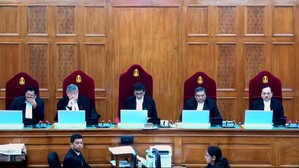AMU status, Delhi Ridge tree-felling: Key judgments to be pronounced by CJI Chandrachud before retirement
New Delhi: With a week’s time left to him in the highest judicial office of the country, Chief Justice of India (CJI) D.Y. Chandrachud is yet to pronounce several important decisions.
Here are the key judgments yet to be pronounced before CJI Chandrachud demits office.
AMU minority status case
In February this year, a CJI Chandrachud-led Constitution Bench had reserved its judgment on the issue of minority status of the Aligarh Muslim University (AMU).
A 7-judge Constitution Bench was hearing a reference arising out of the 2006 decision passed by the Allahabad High Court, striking down the 1981 amendment conferring minority status on the institution.
The Parliament, by virtue of the Aligarh Muslim University (Amendment) Act, 1981 conferred minority status on the institution after a five-judge Constitution Bench in the 1967 Azeez Basha case had laid down that AMU being a Central university, cannot claim to be a minority institution.
In the course of oral arguments, CJI Chandrachud had orally observed that an educational institution could not be deprived of minority status merely because it is being regulated by a statute made by the Centre or a state government.
“Today, in a regulated state, nothing is absolute. Merely because the right to administer is regulated by a statute, does not detract the minority character of the institution,” he had observed.
UP Madarsa Act
A bench presided over by CJI Chandrachud recently reserved its verdict on a batch of petitions challenging the Allahabad High Court ruling which had struck down the Uttar Pradesh Board of Madarsa Education Act, 2004 as unconstitutional and violative of the principles of secularism.
Earlier on April 5, staying the impugned decision, the Bench, also comprising Justices J.B. Pardiwala and Manoj Misra, had observed that the Allahabad High Court misconstrued the provisions of the Madarsa Act and the view taken by it was prima facie not correct.
Delivering a verdict on a public interest litigation (PIL) filed by an advocate challenging vires of the Madarsa Act, 2004, the Allahabad HC, in its March 22 order, had held the law violative of the principles of secularism, Articles 14, 21 and 21-A of the Constitution of India and Section 22 of the University Grants Commission Act, 1956.
It had asked the Uttar Pradesh government to take steps to accommodate madrasa students in regular schools, adding that if required, new schools would be established to ensure that children between the ages of 6 to 14 years are not left without admission in duly recognised institutions.
Can LMV license holders drive light transport vehicles?
The CJI-led Constitution Bench will decide the question of whether Light Motor Vehicle (LMV) licence holders require a separate endorsement to drive a transport vehicle of LMV class.
The Constitution Bench, also comprising Justices Hrishikesh Roy, P.S. Narasimha, Pankaj Mithal, and Manoj Misra, is seized of the reference where the correctness of the decision of a 3-judge bench in Mukund Dewangan judgment has been doubted.
The 2017 Mukund Dewangan judgment had held that the need for a transport licence would arise in the case of medium/heavy goods and passenger vehicles only, adding that no other vehicle will require any separate endorsement, even if they are used for commercial purposes.
In other words, a holder of an LMV license would not require any separate endorsement for commercial usage of light motor vehicles (LMV) like e-rickshaws, cars, vans, etc.
The Centre issued notifications and brought amendments to the Motor Vehicles Rules to bring them in conformity with the above judgment of the Supreme Court.
However, the 2017 judgment gave rise to various disputes over payment of claims by insurance companies in accident cases involving transport vehicles being driven by those having licences to drive LMVs and the matter was re-agitated at the instance of insurance companies.
In March 2022, a bench headed by Justice U.U. Lalit (now retired) held that certain provisions of the Motor Vehicles Act were not noticed by the top court in its 2017 Mukund Dewangan decision and the issue needs to be re-visited by a five-judge Constitution Bench.
In the course of the hearing, CJI Chandrachud asked the Union government to consider the impact on lakhs of people across the country who are engaged in driving commercial vehicles on the basis of the judgement in Dewangan case as they will be “completely put out of their livelihood”.
He repeatedly emphasised that the Union government should review the entirety of the position and then take an appropriate call.
Delhi Ridge tree-felling
A CJI Chandrachud-led Bench is dealing with a contempt plea alleging that a large number of trees on the ridge had been felled by the DDA (Delhi Development Authority) without seeking the top court’s permission.
Delhi Lt Governor V.K. Saxena, who functions as DDA Chairman ex-officio, has expressed his regret before the Supreme Court over the felling of trees in the capital’s Ridge area in violation of the apex court’s order.
Previously, the CJI Chandrachud-led Bench had asked the Delhi LG to file an affidavit before October 22, detailing the steps taken to attribute accountability to the officials who acted in breach of its directions.
It had said that the DDA Chairman should set in action disciplinary proceedings or criminal prosecution against the erring officials without awaiting its direction.
–IANS


Comments are closed.